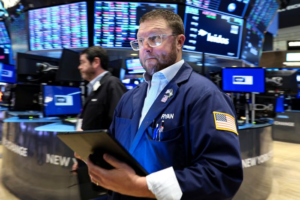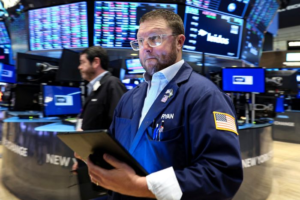

Biotech stocks have fallen to earth with a thud in 2021 after soaring last year amid excitement over the development of Covid-19 vaccines, dealing big losses to some hedge funds.
The sector is being buffeted by concerns Congress will move to put a lid on drug pricing and a surfeit of early-stage biotech shares as the IPO market booms.
Perceptive Advisors, a prominent biotech hedge fund that manages about $9 billion, lost about 30% this year through November in its main fund, investors say. A hedge fund managed by OrbiMed Partners, which invests more than $18 billion in healthcare in public and private markets, has lost more than 40% this year through November, people familiar with the fund say. Both funds had scored big gains over the past two years.
Meanwhile, a hedge fund run by San Francisco-based Logos Capital, which manages about $1.4 billion, is down more than 25% for the period, other people say. Cormorant Asset Management lost 10% in November alone, adding to double-digit losses earlier in the year.
“It’s been a very challenging year,” said
Bihua Chen,
founder of Cormorant, which focuses on smaller biotech companies.
The
(XBI), an equal-weighted index of biotech stocks, has fallen about 22% so far this year through Friday, and is down 37% from its Feb. 8 peak. The ETF has tumbled nearly 9% since Thanksgiving. Biotech is the worst-performing of all 11 S&P 500 sectors this year, a time when the broader index has notched a total gain of nearly 21%.
Consonance Capital decided to close a billion-dollar hedge fund in October after suffering its own heavy losses, said people familiar with the firm. Consonance also operates a healthcare private-equity fund, which has been unaffected by the biotech selloff, according to a spokesman.
The losses follow blockbuster gains over the past few years, when biotech funds were a rare bright spot in the hedge-fund industry. Perceptive was up 31% in 2020 and 49% in 2019, for example. Its founder, New York-based
Joseph Edelman,
recently spent $70 million to purchase an oceanfront mansion in Laguna Beach, Calif., in what agents said is a sales record for Orange County. Logos, which started during 2020, gained 68% last year.

Joseph Edelman founded Perceptive Advisors, which has lost about 30% this year through November in its main fund.
Photo:
Chris Goodney/Bloomberg News
The reversal has caught investors by surprise, coming as biotech companies including
Moderna Inc.
and
BioNTech SA
have achieved historic success developing Covid-19 vaccines that have sent their shares soaring.
“Biotech saw money rush into the sector when the pandemic hit and this year we have experienced the hangover effect,” said
Brad Loncar
at Loncar Investments, which created two biotech exchange-traded funds. One has lost more than 15% this year and the other has gained about 2%. Mr. Loncar said stocks such as Moderna and BioNTech, which are up 194% and 322% this year, have helped mask some of the pain other biotech stocks have suffered.
Biotech companies research and develop drugs, typically in yearslong processes rife with setbacks, outright failures and regulatory uncertainty. But there is also potential for huge wins when they develop successful treatments.
“‘Biotech saw money rush into the sector when the pandemic hit and this year we have experienced the hangover effect.’”
Lately, the sector has been pressured by legislative efforts that have created uncertainty about some biotech companies’ ability to reap big profits. That has sparked selling by generalist investors, or those with less experience trading volatile biotech shares, traders say.
What’s more, a flood of companies in the sector have gone public this year, with 91 biotech IPOs compared with an average of roughly 46 annually in the past five years, according to Dealogic. Many haven’t even started human drug trials.
Acquisition activity—traditionally a meaningful source of returns—was less robust than expected, too, some investors say. And safety scares, including deaths of several study subjects, have dealt a blow to gene-therapy efforts that biotech funds typically back. Some funds also have been burned by betting against the S&P 500 as a hedge against their biotech holdings, traders say.
Some biotech fund managers are sounding notes of optimism. They see the broad selloff as indiscriminate and note that past declines have been followed by robust rallies. Several high-profile Covid-19 drugs could be on the way and falling valuations may boost merger volume in 2022. A Dec. 1 SVB Leerink research note estimated the biggest U.S. and European biopharmaceutical companies could have more than $500 billion of cash by the end of 2022 to use for deals and other activities, with new debt capacity significantly adding to their firepower.
Firms including San Francisco-based EcoR1 Capital, a rare biotech investor whose hedge funds have made money so far this year, are calling in cash from clients to put into newly cheap stocks, according to people familiar with the matter.
—Joseph Walker contributed to this article.
Write to Gregory Zuckerman at gregory.zuckerman@wsj.com and Juliet Chung at juliet.chung@wsj.com
Copyright ©2021 Dow Jones & Company, Inc. All Rights Reserved. 87990cbe856818d5eddac44c7b1cdeb8
















